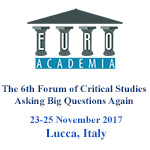Euroacademia Conferences
 Europe Inside-Out: Europe and Europeanness Exposed to Plural Observers (9th Edition) April 24 - 25, 2020
Europe Inside-Out: Europe and Europeanness Exposed to Plural Observers (9th Edition) April 24 - 25, 2020 Identities and Identifications: Politicized Uses of Collective Identities (9th Edition) June 12 - 13, 2020
Identities and Identifications: Politicized Uses of Collective Identities (9th Edition) June 12 - 13, 2020 8th Forum of Critical Studies: Asking Big Questions Again January 24 - 25, 2020
8th Forum of Critical Studies: Asking Big Questions Again January 24 - 25, 2020 Re-Inventing Eastern Europe (7th Edition) December 13 - 14, 2019
Re-Inventing Eastern Europe (7th Edition) December 13 - 14, 2019 The European Union and the Politicization of Europe (8th Edition) October 25 - 26, 2019
The European Union and the Politicization of Europe (8th Edition) October 25 - 26, 2019 Identities and Identifications: Politicized Uses of Collective Identities (8th Edition) June 28 - 29, 2019
Identities and Identifications: Politicized Uses of Collective Identities (8th Edition) June 28 - 29, 2019 The European Union and the Politicization of Europe (7th Edition) January 25 - 26, 2019
The European Union and the Politicization of Europe (7th Edition) January 25 - 26, 2019 7th Forum of Critical Studies: Asking Big Questions Again November 23 - 24, 2018
7th Forum of Critical Studies: Asking Big Questions Again November 23 - 24, 2018 Europe Inside-Out: Europe and Europeanness Exposed to Plural Observers (8th Edition) September 28 - 30, 2018
Europe Inside-Out: Europe and Europeanness Exposed to Plural Observers (8th Edition) September 28 - 30, 2018 Identities and Identifications: Politicized Uses of Collective Identities (7th Edition) June 14 - 15, 2018
Identities and Identifications: Politicized Uses of Collective Identities (7th Edition) June 14 - 15, 2018
The Fluency of ‘Self’: Classical Yoga Philosophy and Performance Identity
-
-

-
Presentation speakers
- Lisa Garner Santa, Texas Tech University, Lubbock, Texas, USA
- Download presentation
Abstract:
While Westerners think of yoga as the practice of physical postures, the inquiry of classical yogic philosophy is actually one of identity, particularly as outlined in the Yoga Sutras of Patanjali. In simplest terms, the integration of the physical and mental practices of yoga supports direct experience with “intrinsic Self,” an ultimate unchanging reality, which is differentiated from “transient self,” a collection of fluid identities. There are two ways in which the concept of identity impacts the artist-performer: the artist-performer’s sense of worth related to self and product, and the fluency of artistic expression. The performer’s identity as “artist” is subject to self-criticism as well as to criticism by the audience. The artist’s cultivated perceptions of these criticisms create reactive patterns of thoughts, feelings, and behaviors, which can either evolve creative output or impede it. Classical yoga provides a method for bringing these otherwise unconscious patterns into consciousness, allowing the artists to objectively assess and develop their work. Otherwise, the artist-performer experiences aversion to identities such as “failure” or “loser,” and attachment to identities such as “success” or “winner.” When artist-performers move beyond the designations of success or failure, they are free to play with identity in an intentionally fluid way. For example, the thespian may act out multiple aspects of a single character such as parent, lover and friend. The musician may shape temperaments within the same work to represent characters such as hero, victim, or villain. The dancer may assume the role of flower, swan or warrior. Additionally, through the scope of their work, the artist-performers may assume the identity of activist, advocate, or peacemaker. The freedom to assume any given identity is facilitated through the practice of classical yoga, the intentional direction of one’s consciousness through which the experience of an ultimate identification with intrinsic Self arises.
-
Related Presentations

The Body on Display: Visualizing and Constructing Criminal Identity in the Dutch Republic
- Anuradha Gobin













